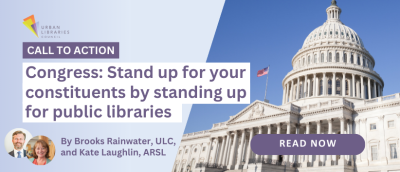Congress: Stand up for your constituents by standing up for public libraries

By Kate Laughlin, Executive Director of the Association for Rural & Small Libraries, and Brooks Rainwater, President & CEO of the Urban Libraries Council
As Congress returns from recess and refocuses its attention to the appropriations process, it must not lose sight of a decision that could fundamentally endanger American public libraries: whether to fund the Institute of Museum and Library Services (IMLS), which provides states with vital grants that strengthen communities nationwide.
In March, President Trump issued an executive order calling for the gutting of IMLS. Since then, confusion has reigned: IMLS grants, which have previously funded programs like Braille books for the blind in Louisiana, education kits for homeschool families in Choctaw County, Mississippi, and STEM literacy programs in Virginia Beach, were originally only partially awarded. Many remain outright canceled. In addition, three state libraries have not received any funds, causing further concern.
Today, the future of IMLS is still far from certain. The president's budget zeroed out funding for the Institute, and as libraries are fiscally responsible institutions, they will not spend money that they aren’t absolutely certain will be reimbursed, meaning many programs that community members rely on remain frozen.
It’s up to congressional appropriators, who are now turning to the bill that covers IMLS, to protect it going forward by maintaining funding at the FY25 level.
Books remain very much at the heart of libraries, but these grants, which state libraries in all 50 states have received annually for nearly 70 years, helped libraries greatly expand the services they could offer patrons, including job skills training, support for small businesses, homeschooling and education materials, and access to food service. These services, which are efficiently run through libraries, would be irreplaceable in many communities if they don’t receive federal funding.
The effects in the library ecosystem already are being felt as libraries consider cutting hours, canceling more programs, and preparing community members to experience longer wait times – with one Alaska library already closing in part due to federal cuts. Small, rural, and tribal libraries with small tax bases and tiny budgets, for which federal funding could be the difference between keeping the doors open, are most at risk. For larger urban systems, the cuts mean greatly reducing their ability to be innovators whose programs are emulated by libraries all over the country. Even more crucial, urban libraries often serve double duty by helping smaller rural libraries in the state by sharing their collections through interlibrary loans or offering tech expertise, assistance only made possible through federal grants.
Done in the name of efficiency, these cuts are anything but, as libraries have shared with us. The Iowa State Library found that interlibrary loans saved nearly $1 million across the state in postage for 544 separate libraries. And in Arkansas, a federal block grant provided libraries statewide with access to 50 databases for a total of $850,000. Individually, institutions in the state would pay $53 million in taxpayer funds for the same resources, according to the state library.
Indeed, over the last few months, we have heard story after story from libraries big and small about what this money has meant for their patrons, driving home just how much libraries could wring out of a relatively modest amount of money – just 0.005% of all federal spending.
In Cedar Rapids, Iowa, when a destructive derecho storm obliterated the city’s tree cover and did millions in damage, IMLS funding allowed for the library to roll out mobile hotspots and laptops to help residents apply for FEMA funding. And the Starkville-Oktibbeha County Library in Mississippi shared how its music therapy program for people with Alzheimer's and dementia was only possible through IMLS – and how, in a state with the lowest-funded per capita libraries in the United States, at least two peer library systems funded their entire book budget through IMLS. At the largely volunteer-run Pottsboro Library, in a rural town near the Texas-Oklahoma border, elderly community members access essential telehealth services at the library, while local teens received certification in drone operation that’s since helped some earn $100 an hour. However, as local funding is being pulled, the director of development has told us that the library will close if IMLS funding does not continue.
Over the past few months, we have had encouraging conversations with members of Congress in both chambers and from both parties. It's clear that, if one thing can unite Americans in this fractured moment, it's the love of the public library that for so many of us started as children. To ensure that future generations enjoy what we had, and that all Americans have access to the community resources they need, Congress should act to protect what has improved so many of their constituents’ lives.
Kate Laughlin is the Executive Director of the Association for Rural & Small Libraries, which builds strong communities through advocacy, professional development, and elevating the impact of rural and small libraries. Brooks Rainwater is the President and CEO of the Urban Libraries Council, an innovation and action tank of North America’s leading large public library systems.
